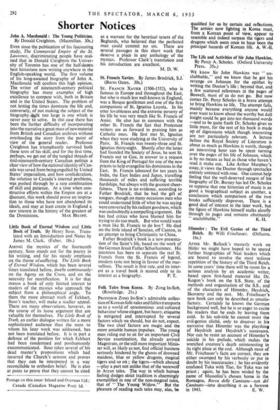St. Francis Xavier. By James Brodrick, S.J. (Burns Oates. 30s.)
ST. FRANCIS XAVIER (1506-1552), who is famous in Europe and throughout the East, but who is much less well-known in England, was a Basque gentleman and one of the first companions of St. Ignatius Loyola. In his utter lovableness and the extreme poverty of his life he was very much like St. Francis of Assisi. He also has in common with the other St. Francis the fact that Protestant writers are as forward in praising him as Catholic ones. He first met St. Ignatius when they were studying at the University of Paris. St. Francis was twenty-three and St. Ignatius thirty-eight. Shortly after the latter had founded the Society of Jesus, he sent St. Francis out to Goa, in answer to a request from the King of Portugal for one of the new priests to help evangelise his dominions in the East. St. Francis laboured for ten years in India, the East Indies and Japan, travelling thousands of miles and suffering terrible hardships, but always with the greatest cheer- fulness. There is no evidence, according to Father Brodrick, that he had the gift of tongues, though on many occasions men who could understand little of what he was saying were converted by his radiant goodness, which was undoubtedly a compelling argument. He has had critics who have blamed him for trying to do too much. But who would want a man like St. Francis to do less? He died on the little island of Sancian, off Canton, in an attempt to bring Christianity to China.
Father Brodrick's book is a new presenta- tion of the Saint's life, based on the work of the German Jesuit Father Schurhammer. His intention has been to separate the real St. Francis from the St. Francis of legend, modern taste not being in favour of the mar- vellous. The result is first rate, and its inter- est as a travel book is second only to its interest as a biography. P. T.


































 Previous page
Previous page